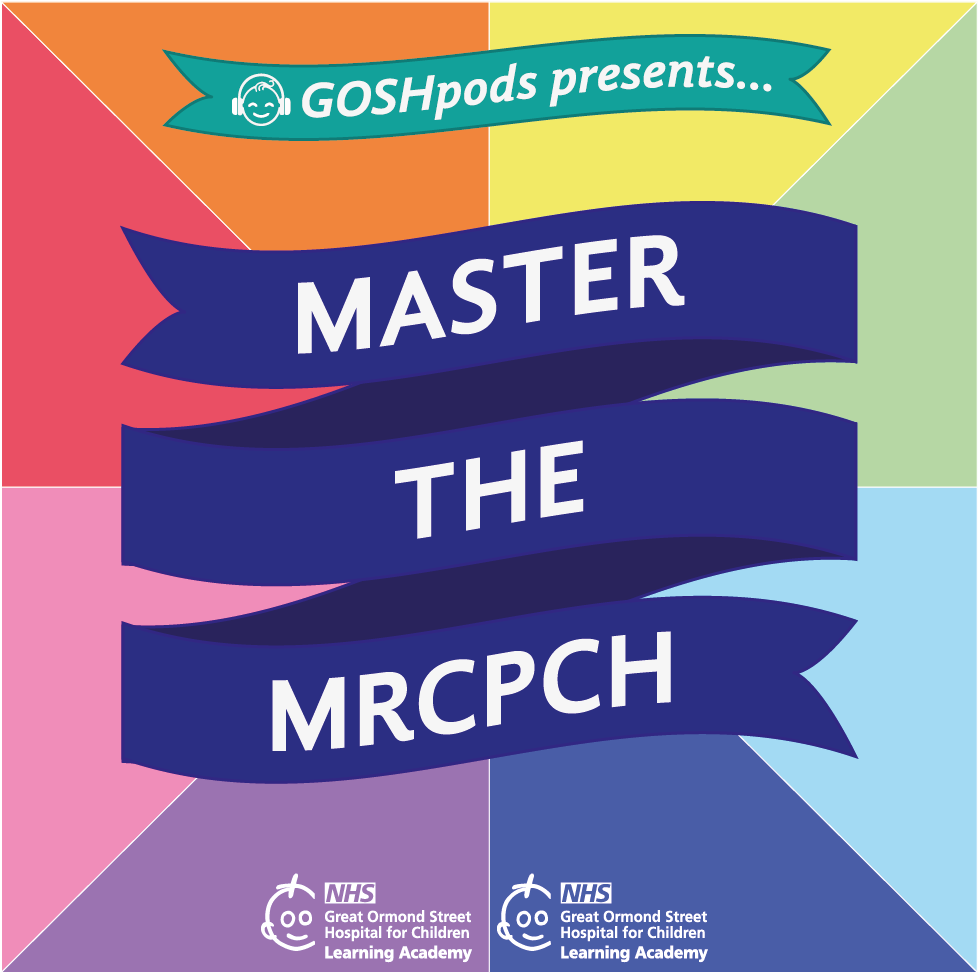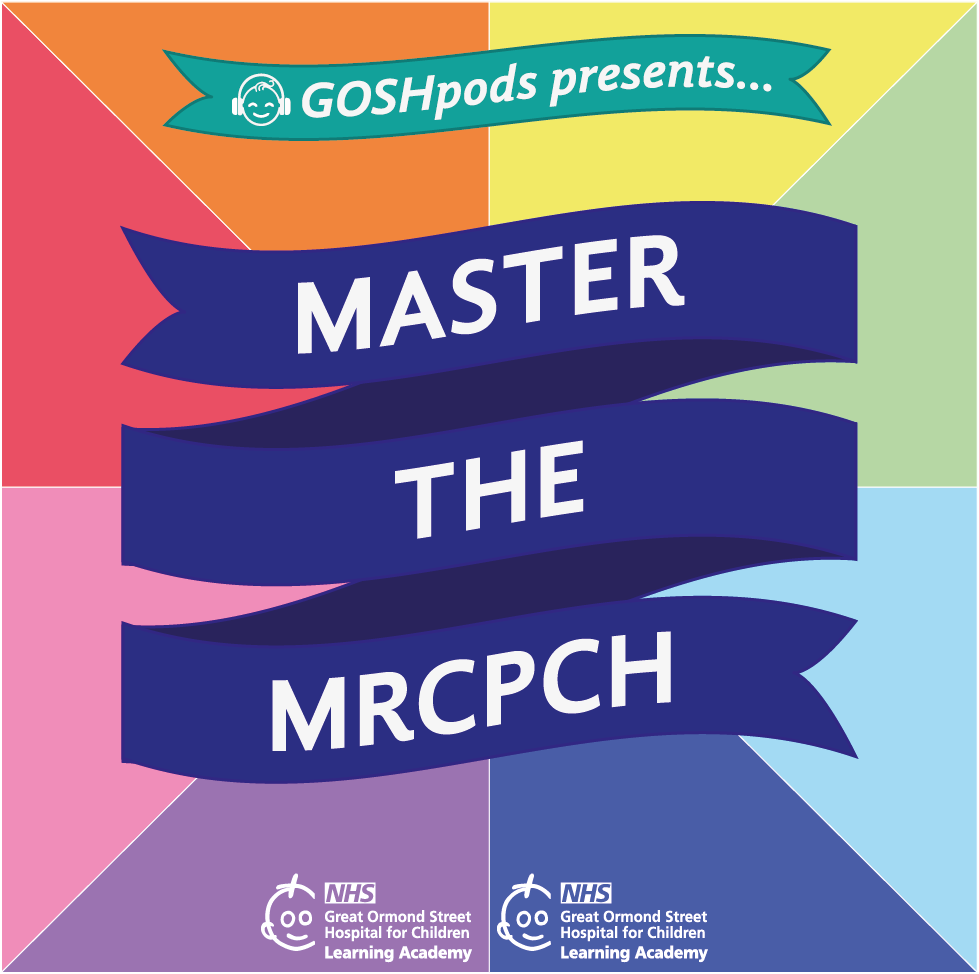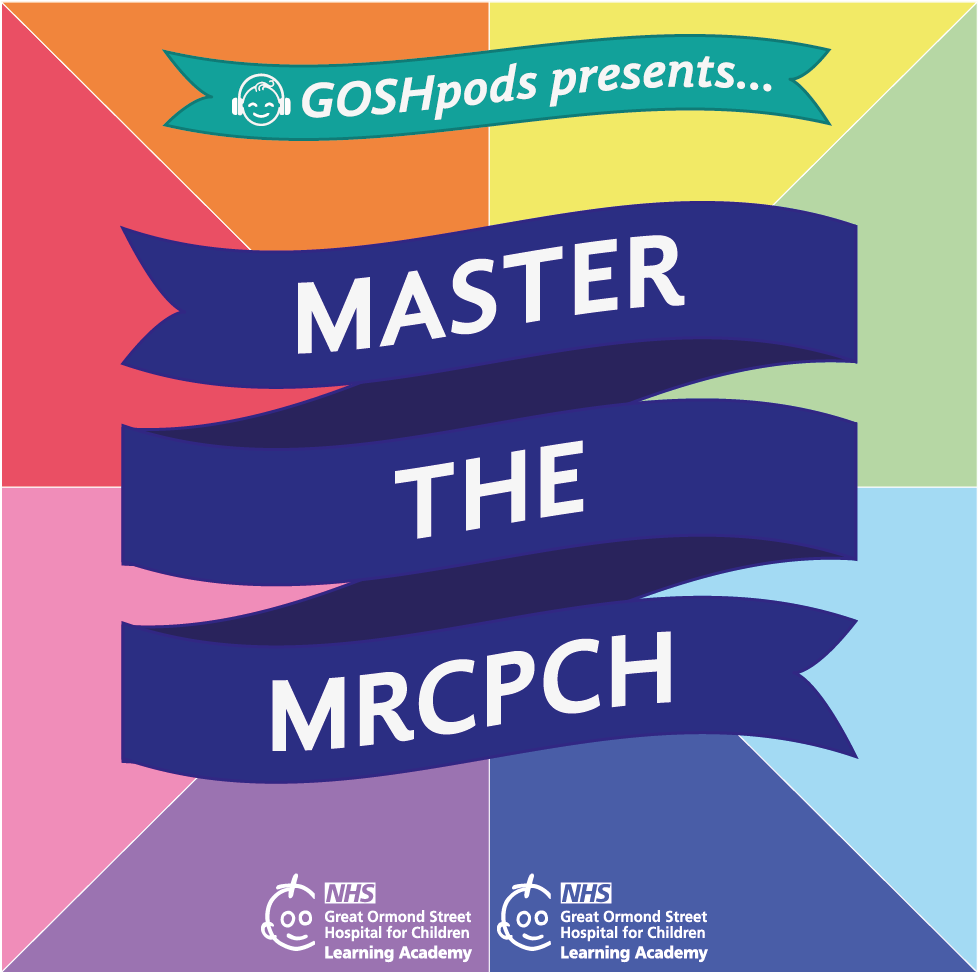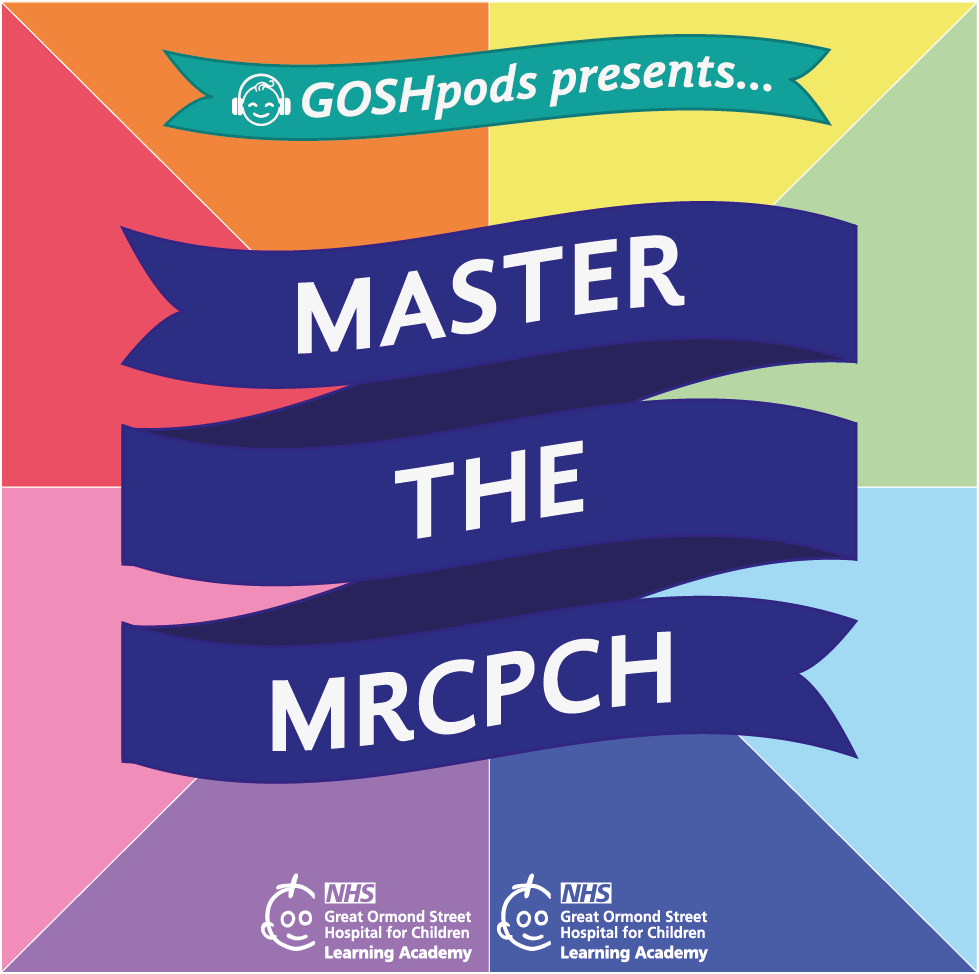EF: Hello and welcome to Master the MRCPCH. In this podcast, we tap into the expertise here at Great Ormond Street Hospital, giving you an overview of a topic on the RCPCH curriculum. You may be revising for an exam or just fancy brushing up on a need to know topic. I'm Emma, an anaesthetic registrar and the digital learning fellow at GOSH. Today I am joined by Dr. James Davison, a consultant in metabolic medicine at GOSH, who will be talking to me about newborn screening for metabolic and other conditions. This topic corresponds to several areas of the RCPCH theory exam syllabus, under neonatology, metabolism and metabolic medicine, as well as the science of practice. It could also come up in the clinical.
Thank you Dr. Davison for coming on the show again today. What would you like people to get out of this podcast?
JD: So, I hope what we're gonna cover today is just a real overview of the newborn screening bloodspot tests that are done. Just have an awareness of what it is we're screening for, why it is we're screening for those conditions. And we'll have a particular focus on the metabolic disorders that are part of that screening panel.
EF: So to start, can you give me an overview of what the newborn screening test is, and the conditions it tests for?
JD: Within the NHS, we have a newborn screening program and that has several components. One of those is the blood spot test that we'll talk about today. The newborn screening program also includes the newborn screening hearing test and the newborn examination test as well. But we're not gonna talk about those two latter parts as well. We're focused on the blood spot test today.
And the blood spot test is collected on day five, usually as a heel-prick blood test. And this is screening for a number of conditions and of those a number are metabolic disorders. And so it's important just to be aware and familiar with which conditions we are screening for.
So the screening test is aimed to look for a number of conditions. The non-metabolic ones are Sickle Cell Disease, Cystic Fibrosis, and Congenital Hypothyroidism. And then the metabolic conditions that are on the current screening panel. There are six of the metabolic disorders, which are Phenylketonuria, or PKU, MCADs, which is the Medium-chain Acyl-coA Dehydrogenase Deficiency, one of the fatty acid oxidation problems, Maple Syrup, Urine disease, MSUD, a condition called Isovalyric Acidaemia, another disorder called Glutaric Aciduria Type One, and finally, Homocystinuria.
So those are conditions that are routinely screened universally. And then in some areas of the country, there is also screening for Severe Combined Immunodeficiency, or SCID, which is being rolled out as a pilot study as well. So those are the conditions that are being screened for at the moment.
EF: I think when I was in medical school, we called this the Guthrie test. Is this the same thing or is there something about it that's changed?
JD: So yeah, this is often referred to as the Guthrie test. Absolutely correctly, the Guthrie test is a reference to a particular technique that was originally developed for testing for PKU. It's a bacterial inhibition assay. So the Guthrie test, named after Dr. Guthrie who devised it, was that specific test. The methods are different now. We now use a mass spectrometry methods, and we are referring, obviously, to all of these conditions and testing those. So, although it is referred to as the Guthrie test, accurately we are beyond that now.
EF: And why do we screen for these particular conditions? Why have they been chosen for screening?
JD: That's a very good and important question. And the rationale for screening for any of these conditions is that you want to make the diagnosis of the condition before it starts causing problems, so that you can step in with treatment and improve the outcome for the children. That's a very short version of the criteria that are described by Wilson and Junger as the screening criteria. And within the UK, the National Screening Committee will assess and evaluate any disorders that are being proposed for screening. And these conditions have been considered to be those that meet those criteria, which are important to screen. They're important conditions, and ones that we know we can step in and make a difference with treatment.
It's not universal. And there are other conditions that potentially would meet those criteria that are not yet on our screening panel. But the, the reason that these ones are here is that we know we've got good treatments that can improve the outcome for those children.
EF: Earlier you mentioned that the newborn blood spot test tends to be done about five days of life, five days old. Is this timing important?
JD: Yeah, so the timing is set around particularly the thyroid screening, and making sure that the timing is correct, that we can have the best pick up for that condition. And because we only want to be putting the child through one test. All of the tests are done at the same time, and for logistical reasons that's important and so it has to be done on that day. Actually for some of the metabolic conditions, we know that children can already be becoming unwell by the time the screening test is taken and the results come through. But we have to weigh up all of the different things we're trying to screen for and so that's why it's done on day five. There are some slight differences if you are a preterm baby, and if you are born less than 32 weeks gestation, then there has to be a repeat taken later on, again to evaluate particularly hypothyroidism.
And if you've got a child who's been admitted to hospital unwell, they would often have an early screening sample taken in case they go on to have a blood transfusion. And if a child has had a blood transfusion, that can also interfere with the testing. So there may be some situations where a repeat sample is needed. There's a very robust system in place to make sure that children aren't missed, and to ensure that those follow-up samples are taken. But day five is set as a routine day.
EF: And what would happen in the event of a baby testing positive for one of the conditions?
JD: So yeah, it's important, as you said, if we get a screen positive result that we then follow through to evaluate whether that's a true positive result and to take forward the key diagnostic tests. Exactly what will happen depends on each of those individual disorders that we're referring to. Within the metabolic tests, which are the ones we are focusing on today, if a screen positive result is flagged up from the laboratory to the clinical team, then one of our team, usually our clinical nurse specialists, will make the first contact with the family to establish a bit of the background to understand where the child is, whether the child is currently well or unwell, and then to advise the family about what are the next steps are that we need to do.
Depending on the condition would depend on how urgently we are doing that. Some of the metabolic conditions we're screening for, we know the children can become acutely unwell with severe metabolic problems, such as Maple Syrup Urine Disease, where they can become encephalopathic, with very high Leucine levels. And so for that condition, we would be making arrangements on the same day for the baby to be admitted urgently to hospital and for treatment to start. For some of the other conditions where we know we need to step in, but there isn't that same urgency for acute problems, we would within 24 hours have that first contact and to see the family to, to put treatment in place.
So when we've made that first contact and then arranged to see the child one thing we have to be aware of is that this is a screening test, and we do then need to have the confirmatory tests collected, which will usually be further blood and urine samples. To evaluate, to confirm whether or not the child is affected. And usually for the conditions we would be putting in place initial management while we are clarifying the situation. And then if the diagnosis is confirmed, we'll go onto full treatment. And if we find that actually the diagnosis is not true and it's a false positive screening result, then we would evaluate why that's come through, but then be able to deescalate the treatment at that point.
EF: How sensitive and specific are these screening tests? What's the likelihood of a result being a false negative or a false positive?
JD: Again, it varies between the different disorders and again, between the metabolic and the other conditions as well. The National Screening Committee are rightly very keen that we avoid false positive results, where you might be making contact with a family and then generating a lot of anxiety and the need for additional testing. So the testing thresholds are set to avoid as much as possible those false positive results. But also we don't want the screening program to be missing children. And so in general, the sensitivity for the tests are very high, and we try to optimise the specificity as far as possible. We do know that there is the possibility for false negative results where we miss a case and a child may present later on despite having had the newborn screen. And that's a situation for one or two of the metabolic conditions such as Glutaric Aciduria Type One, where for various reasons, that may be missed on that initial test.
We've seen a particular problem with one of the tests we're looking for in the metabolic, with false positive results for Isovalyric Acidemia, where we have found that particular antibiotics that are commonly used in pregnant ladies can interfere with that assay and give us a positive result. So one of the things we'll be evaluating when we make that first contact with the family is, is there any potential reason for why this might be a false positive result and then acting accordingly from there.
EF: This all sounds fascinating, but very specialist. Is there ever an occasion where a general paediatrician might be brought in to managing one of these children or have to get involved in their treatment?
JD: So if we get a screen positive result for one of these conditions, it is the specialist teams who are notified and who make that contact. However, we do have to then work very closely with where the child is and their local hospital. And again, for the metabolic conditions, if it's one of those where we know that they can become acutely unwell, we will be liaising with the general paediatric team at that hospital to get the child admitted for the initial emergency management. So that's one of the reasons why it's really important that everybody's aware of these conditions. You would then be given all of the information, and talked through the initial management and what we need to be doing. But it is important for that.
And there could be an occasion as well where a child has already been admitted to hospital unwell, who's presented symptomatically, and then we get the screen positive result, and then we establish that the child is in hospital. And again, in that situation, we would be liaising closely to to take the management forward. But in that situation, again the general paediatric team might be involved in discussing that result with the family. And having an awareness of where we're going, and what treatment options are gonna be there, will be important.
EF: Great, thank you. Before we let you go, we just have some quick fire questions to ask. Firstly, are there any classic exam questions that tend to pop up about this topic?
JD: I think it's important that you may get asked about which conditions are screened for. And I think that is where it may well often appear in the theory papers, and having that awareness as we've talked about which disorders are there and the timing around screening is very important.
EF: Secondly, are there any useful resources that you would recommend for people who might want to find out a bit more about this area?
JD: Yeah, so there's some very good publicly available information on the NHS website. If you were just to search up for the NHS Bloodspot Newborn Screening program, that will take you through to some information. Again, it's designed for families who are either considering consenting to screening or who've had a positive screen, but there's some good background information about the different disorders. I would also point you to the British Inherited Metabolic Diseases Group, the imdg.org.uk, where there is a lot of information about the newborn screening program. And then also on there are all of the protocols that we follow through, if we get a screen positive result, and if you are involved in a case, there's some very good clinical resources there that can also be useful for your exam preparation as well.
EF: That's great. Thank you. Finally, what are your three takeaway learning points from today?
JD: So I think these are all rare conditions that we're screening for, but they're important to be aware of. And it's important that you've got awareness of what your involvement might be should we get a screen positive result. I think secondly, it's important to remember that these are screening tests that don't exclude all metabolic disorders. So we're only screening for six metabolic conditions out of several hundred disorders. So just because a child has had screening, doesn't exclude them from having a metabolic disorder. So if they're presenting later on, we still need to remember that. And I think finally we talked a bit around the timing and making sure that we don't miss any children from screening, so if there is a baby that's been admitted, either preterm, or they're been admitted unwell, that the screening is completed and we don't miss the opportunity to undertake this important testing.
EF: Fantastic. Thank you very much for coming on the show today, Dr. Davison.
JD: Thank you again for having me.
EF: Thank you for listening to this episode of Master the MRCPCH. We would love to get your feedback about the episode, and get your ideas for future topics that you would like to hear covered. You can find a link to our feedback page in the description for the episode, or email us at
[email protected].
If you want to hear more about the work of the GOSH Learning Academy, you can find us on Twitter, Instagram, and LinkedIn, or visit our website at www.gosh.nhs.uk and search 'Learning Academy'. We hope you enjoyed this episode, and we'll see you next time. Goodbye!



